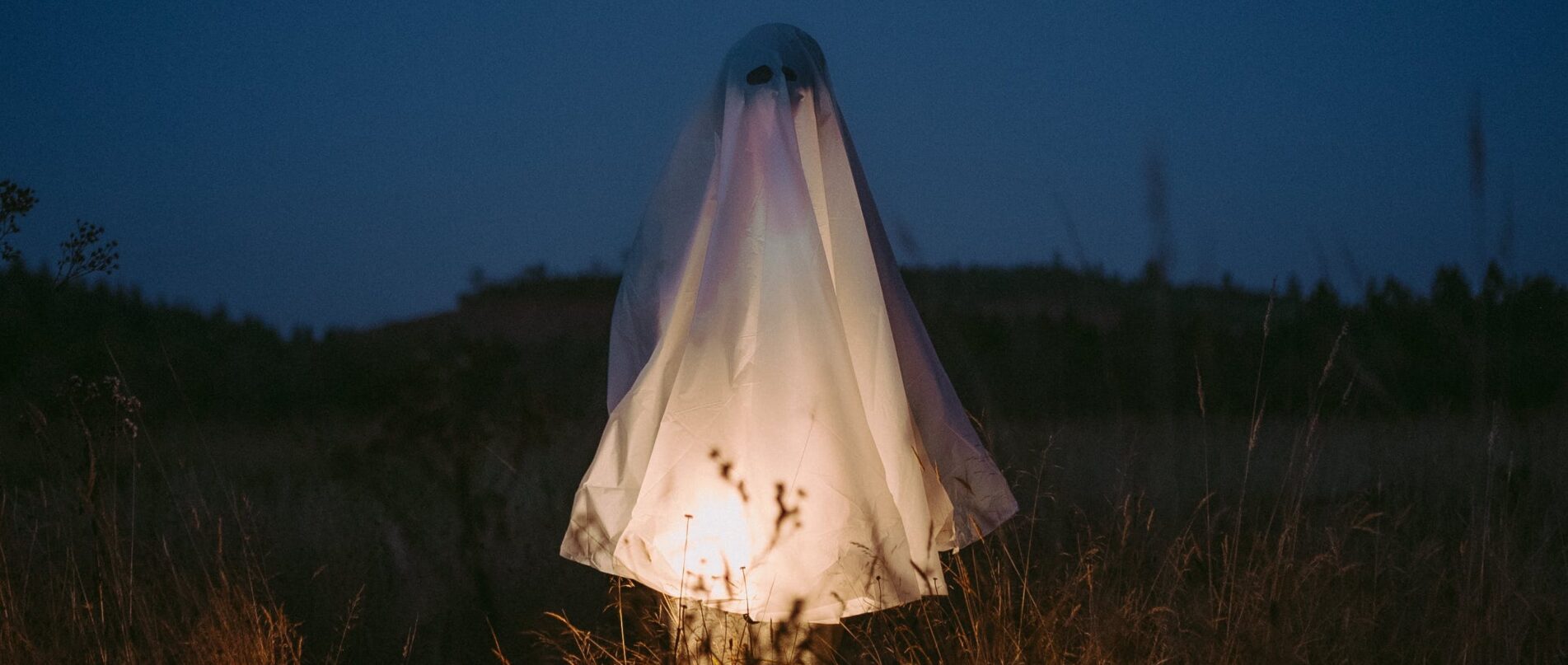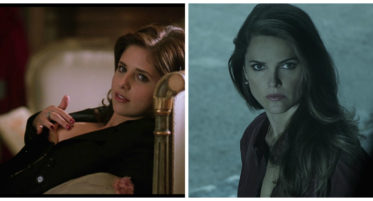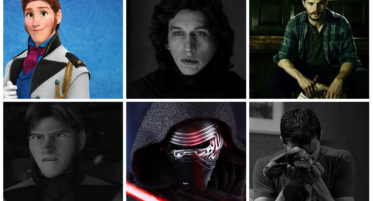
Prompt Images
Madigan’s interest in the paranormal began in third grade, springing from a single conversation in his best friend Mildred’s backyard. Beneath the lofty arms of the old elm rooted in the center of her yard, they climbed her swing set with the dexterity of slightly drunk orangutans, throwing out random pieces of information that took them on wide-ranging tangents about everything from the glorious dodgeball game at recess to the bad words that led Madigan’s older brother to get sent to his room without chicken tenders.
While interesting, none of it was earth-shattering, that is until Mildred dropped her gigantic truth bomb. The admission startled Madigan so much, he lost his balance on the gutter edge of crimson slide, and slipped down it, traveling head first towards the grass.
“Your house is haunted?” Madigan asked, lifting himself up by the press of his palms.
His eyes, gray as the overcast sky, flew to Mildred’s house, searching for signs of an invisible presence. Did that curtain just move? Was that the ghost? Was it watching them? Would it hurt him?
With her legs planted on either side of the teeter totter, Midlred’s head wavered as her legs did the same. “It’s not haunted. It’s ghostly.”
“Ghostly?” In Madigan’s head rang his grandfather’s voice, a ghost himself considering he had passed away six months before. That there is a $5 word in a $2 sentence.
“Ghostly,” Mildred repeated. “Haunted sounds scary. My house is ghostly, like ghosts live there, but they aren’t scary.”
“How do you know that? Have you seen them?
She nodded, and Madigan’s jaw plummeted faster than a skydiver in freefall. No wonder Mildred’s sister dropped the “Mil” and just called her “dread.” She had a connection to the dead.
“A few times. They haven’t hurt me or anything. They just kind of… hang around.”
“What do they look like?”
Mildred squinted at him, the brightness of her green eyes shining through the slits. It was a look he, from that point on, used as the barometer to gauge if someone thought he was being stupid. In Mildred’s case, the answer was a resounding “yes.”
“Like people,” she said. Madigan’s world shifted again to make room for this idea that ghosts weren’t floating blobs of white like the Halloween decorators had told him, the liar.
“But like see-through? Like a whole body?”
What if it was just a torso? Or a head? Or even more terrifying, a face in the mirror that appeared at your shoulder and made you scream so loud your mom you hadn’t seen in three years came running?
As Madigan began his trek back up the slide, the rubber of his camo sneaker squeaked against the plastic, bellowing at them both.
“Like regular people except they’re there, and then you blink and they’re not.”
“Weird,” he breathed, because what else was there to say?
Mildred rocked back and forth on the teeter totter, her chestnut braids swinging as she picked up momentum.
Her gaze stayed focused on the ground. “Do you not believe me?”
Throughout his life, there were few times that Madigan heard Mildred’s confidence waver from the usual purpose and determination she typically spoke with. Even in third grade, she was certain. This moment, however, was the first he tabbed in her file of self-skepticism.
“No, I believe it,” he said and he genuinely meant it. He had no reason to doubt her, and as such, from that point forward he believed in ghosts, in a life beyond the veil.
The belief dotted Madigan’s childhood.
In a persuasive essay in fifth grade where he listed evidence to prove ghosts exist. Or in the ghost hunter show that Mildred dubbed as disrespectful to the dead, but Netflix counted among his most streamed. Or in the seances they held in Mildred’s attic throughout high school in the hopes that Madigan could finally connect with the spirits, unfortunately to no avail. Or in the bucket list he compiled in his senior year where he wrote “see a ghost” in his top 10.
Whenever he felt the air shift, heard sound drop away, or saw a flicker of light, he whispered, “ghostly?”
And more often than not, from her spot beside him, Mildred nodded. “Ghostly.”
The refrain stuck with him, even when Mildred no longer did, and her chestnut hair, and spindly legs became more frequent in memory than present moments. Lives separated by 1,000 miles and then an ocean had the tendency to draw people apart. One night, when he was off at college and homesick, he told his dad how much of his own life felt “ghostly,” like it had passed away and he was living with the remnants of it. His dad meant well, but all he could say was, “you mean haunted?” and another layer of loneliness shellacked itself over Madigan’s heart, as he ached for the person who would’ve understood, but who now was four scrolls deep in his recent text lists.
This was life, he reasoned. Growing up together doesn’t mean growing together forever.
Everything changed, and like the ghost he was destined to become, people passed in and out of our lives, some revealing themselves, others remaining invisible, but all fleeting.
By the end of college, he had come to describe Mildred as his “ghostly” friend. She wasn’t haunting him—her memory offered Madigan too much comfort to ever be labeled that way—but she was with him all the same, hanging around him like an imaginary friend, present to him but to no one else. He swore sometimes he saw her, a familiar figure lingering in the edge of his periphery and disappearing when Madigan tried to look. How annoying yet appropriate that the person who made him believe in ghosts had become one to him.
Five years out from their last hang out, his mind continued to conjure her where it could—in his apartment kitchen, on the walking trail across town, or passing his cubicle he crunched numbers for an upcoming project. At some point, he realized he couldn’t tell what he wanted more: to see a ghost or Mildred in the flesh.
Nearly 20 years to the day Mildred first made him believe, Madigan found himself trying his luck again at ticking that bucket list box.
He liked to think that the chances were relatively high in Edinburgh, the city dozens of websites described as one of the most haunted in the world. For two years, he and his friend, Toby, had saved for the trip, stashing away any money they could after paying their overpriced rents and grocery bills. Toby didn’t care much about the ghosts—he was fascinated by Edinburgh because of its stunning gothic architecture—but he was indulging Madigan all the same by taking ghost tours and stopping in supposedly haunted haunts.
On their second-to-last night in the city, Madigan pulled Toby into The Grey Duke Bar, a tavern said to have been the favorite drinking spot of a long-dead Duke of Edinburgh and his band of seedy friends. Despite their visits to 90 percent of the places listed on the city’s most haunted list, Madigan had come up empty on his sightings. Toby, however, swore on his mother’s life that he saw a shadow figure at Edinburgh Castle, the lucky bastard.
As far as Madigan could see, the Grey Duke Bar was his last shot.
“He looked like he was dressed in a skirt,” Toby said to the patrons on the barstools beside them, regaling people with the details of his sighting for the seventh time in the past two hours. With each ale he drank, the story became a bit more sloppy, and somehow less entertaining.
To his left, Madigan swirled the dark liquid in his tumbler, watching the way the Scotch licked up the side of the glass. He had lost interest in the conversation after Toby’s third retelling, and had settled on half tuning in and half stewing in his own bitterness. “It was probably a kilt,” he supplied through a mutter, but Toby didn’t catch it. For someone who didn’t care about ghosts, Toby sure loved to talk about them.
“I swear, he was carrying that—that instrument. Ba—” he pantomimed blowing into a horn, and moved his fingers as if he was pressing invisible keys. “You know what I’m talking about. It sounds like—” From his mouth a noise poured like a congested, dying duck. Madigan sighed, while the two patrons Toby was trying to impress bore expressions somewhere between confused, disturbed, and delighted.
Shaking his head, Madigan brought his glass to just below his mouth, and looked towards his friend, ready to end his embarrassment and his own eardrum’s suffering. “Bagp—” but the words died on his tongue.
Ghostly.
Across the room, in the golden light of the bar’s electronic candlesticks, Madigan saw her: dark brown hair twisted into a braid, flashing green eyes, mole at the corner of her burgundy lips, black dress patterned with tiny orange foxes, black leather saddle bag resting against her hip.
Her, her, her, her, her. Mildred.
It had to be a ghost of his mind, an apparition of wishful thinking. Madigan blinked, and blinked again, and when she didn’t disappear like she always had, he shook his head, as if the motion could dislodge the mirage that had taken over his brain. But she was still there.
Dazed by more than scotch, Madigan dismounted from his stool and made his way across the tavern, slowed by the clumps of people imbibing along the bar and clumped near pub tables. Each time someone crossed in front of him and took Mildred from his view, he was convinced that she’d have vanished before she came into his line of sight again, but she stayed, solid, settled, and sipping from pewter pint.
By the time he was within two feet of her, he could feel his pulse thrumming throughout his body.
“Mildred?” he asked, and five sets of eyes swung towards him. It was only then that he realized she was not alone, but with a group of people, all of whom looked like they were dressed for a day at the office more than his tourist get-up—dark-washed jeans, a black bomber jacket, white t-shirt, and Adidas sneakers caked in Scottish dirt.
Self-consciousness lapped up within him, and based on Mildred’s expression, she had waded into a similar tide, awash with rare waves of uncertainty.
“Mad?” she said, squinting at him. It rated low on the “assessing stupid” barometer, but high on the “can I believe what I am seeing” readings. She slid off her perch and over to him, stopping with just a few inches between them. “Madigan Walters?”
“Mildred Christenson?”
Her wide smile forced the questioning from her face as he enveloped her in a hug.
Five years since they had last seen each other in person and seven months since they had last heard each other’s voice, they had found each other 5,694 miles away from their hometown without even planning. What were the chances? Probably, Madigan reasoned, as slim as seeing a ghost.
“How are you here?” he asked when they had untangled themselves from one another. The fact that she was in Europe was no shock. If he would’ve run into her in Amsterdam, where she worked at a fancy literary magazine (because of course someone as interesting as she did), he almost would’ve expected it, or at least hoped for it. But to cross paths here was completely different.
“Business trip. We’re opening up a Scotland branch and they wanted me to help get everyone on board,” she said.
“Of course they did.” Unlike some people, Mildred’s certainty was complemented by an equal dose of competence. “You know your stuff.”
“You bet your ass I do,” she said in a low voice that in the hum of the bar couldn’t travel beyond their pair. Their laughter on the other hand could—and did. Mildred brushed his arm with her fingers. “What about you? Why are you here?”
“Just wanted to visit.”
A knowing smile pulled at her lips. “Would that have anything to do with Edinburgh’s notoriety for ghosts?”
“No, you know me,” he said, wryly. “I’m strictly here for the Sir Walter Scott monument.”
“Ah, that’s right. I forgot you had a thing for men in notch collars and tail coats.”
“Exactly,” he nodded. “The ghosts are just an added bonus.”
Mildred cocked an eyebrow at him. “Have you seen any?”
Before he could respond, a weight bombarded Madigan from behind, taking the shape of an outstretched arm. “Madigan!” If he were in any other mood, Madigan wouldn’t have been unable to suppress his grimace, but in Mildred’s proximity, he succeeded.
“Toby!” he replied, although a bit less enthused than his friend, but that was more due to their differing blood alcohol levels than anything.
With his fingers tight around the neck of his ale, Toby waved his arm towards Mildred.“Who’s this?”
“This is—” Madigan started, just for Toby to extend his other hand to Mildred and introduce himself.
“I’m Toby.”
“So, I heard. I’m Mildred,” she replied, shooting an amused glance at Madigan as she shook Toby’s hand.
“Mildred?” Toby’s mouth went agape and his eyes wide, emoting the shock that Madigan felt earlier. He reached to grab Mildred by the shoulders, but she subtly dodged him with a small step back. “You’re his haunted friend.”
Slowly, Mildred’s head titled, and her eyes narrowed as they traveled to Madigan. “Haunted?”
“I told him that you and I were both pretty into ghosts, but that is not the word I used,” Madigan said. “I’m not disrespectful like that.” To be honest, he was grateful that Toby left it at haunted instead of what he liked to call Mildred to needle at Madigan—”his long lost love”—because, like too many people Madigan and Mildred had known over the years, Toby couldn’t compute how their friendship was nothing more than the platonic bond it was. Such an assumption had led Mildred to call one of their high school friends an “unimaginative, patriarchal imbecile,” and Madigan had agreed, but in fewer $5 words.
“I hope not,” she said with an air of indignation, before turning her attention back on Toby. “I prefer ghostly friend.”
“Oh-kay,” Toby chucked. He took a drag of his beer and raised his hand excitedly as he swallowed. “Oh, oh, I have to tell you about the ghost I saw today. You’ll love it!”
Madigan had no time to stop Toby before he launched into his story, or when, overhearing it, Mildred’s coworkers asked him to tell it again. As her coworkers shared their own encounters with Edinburgh’s long-past residents, Madigan squeezed onto a stool next to Mildred, and caught up with her through whispers and jokes that no one beyond them would find funny. Madigan had always hoped that theirs was the kind of friendship that could pick up again after months or years and feel just as comfortable as it had when they saw each other every day. Beside her, trading stories of their routines and memories from years past, the atmosphere in that Scottish bar was no different than that found on her swing set in elementary school.
“Do you want another drink or anything to eat?” Madigan asked after what could’ve been five minutes or five hours. Based on the crowd and the lighting, he put it closer to two.
Mildred pursed her lips in deep thought. “Possibly some food. What are you going to get?”
Madigan searched the tavern for the menu he had seen posted on a patch of exposed brick, but a figure at the edge of his vision caught him, like it had so many times. The person was tall, at least six feet if not more, and decked out in a long coat, gilded with filigree and adorned with some sort of sash. At his waist was a swashbuckle. His hair was pulled back into a low ponytail with a bow, the top of his head covered with a black triangular hat.
At first, Madigan thought it was someone in costume, maybe who had worked a shift at the period restaurant down the street. But normal people didn’t glimmer at their edges, or have the ability to traverse a crowd by walking straight through it, without displacing a single soul.
He blinked, blinked again, and shook his head, but the figure remained.
“What’s up Mad?” Mildred asked, and he aimed his finger across the room, where the figure was headed towards the bar. Was he seeing things? Was he actually fulfilling his bucket list? He needed confirmation. He needed it from her.
“Ghostly?” he whispered, watching the man enter the bathroom by dissolving into the door.
In his periphery, Mildred nodded. “Ghostly.”



